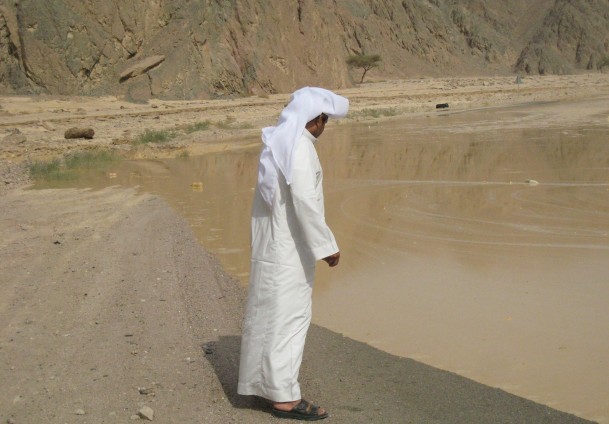
How does Shell perceive the current investment climate in Egypt?
Shell is proud of its 100-year history in Egypt. We are one of the major operators in the Western Desert. We have a unique business portfolio in Egypt encompassing upstream (exploration and production), downstream as well as gas distribution.
The Government continues to work hard to maintain an attractive climate for oil and gas investment in Egypt, however there are still some measures that could be taken to unlock further investments in more difficult and expensive oil and gas resources.
Since 25 January 2011, how has Shell performed in terms of average production of hydrocarbons?
Shell is focusing on an ambitious exploration programme in Egypt. Last year the company made five new Hydrocarbon discoveries in the Obaiyed area, West Sitra and Alam El-Shawish concessions, all located in the Western Desert. This year a number of additional discoveries were made, some of which require further work to determine their size. Shell’s production optimisation and well intervention activities have helped our joint venture Badr El-Din Petroleum Company (BAPETCO) to maintain an average daily production of around 110,000 barrels of oil per day (bpd), offsetting the rapid decline in most of the oil and gas reservoirs.
What is Shell’s strategy for the coming five years in Egypt?
In the coming five years, we will continue to focus on portfolio growth and plan to invest and maximise the use of our current assets in the Western Desert, where we focus on the Obaiyed area and Abu Gharadig basin. We are keenly awaiting the outcome of the 2011 EGPC tender where we hope to be awarded additional acreage for exploration and development. We are also studying other opportunities as offered by EGAS and Ganope and may participate in bids and tenders. We will continue building on our partnership with the Government of Egypt mostly through our Badr El-Din joint venture with EGPC, which is an indispensable element in our success.
According to your studies, are the known oil and gas basins in the Eastern Desert, the Delta and the Gulf of Suez area on their way to depletion?
It is a fact that the conventional oil and gas fields are declining, some fields more rapidly than others. Our view is that there are still many under-explored areas in Egypt that have potential oil and gas deposits yet to be found. However the so-called ‘easy’ oil & gas is now more rare to find, while deploying new technology and drilling expensive wells are needed to unlock the more difficult oil and gas resources
One technology that will contribute to extracting more oil out of a reservoir is Enhanced Oil Recovery, as for a variety of reasons conventional methods still leave well over 50 per cent of the oil in place. Shell and its partners have globally more than 10 EOR projects in operation or at the development stage and more than 25 field trials or studies underway and we are keen to introduce EOR in our operations in Egypt as well.
Mediterranean gas is said to be the future of the hydrocarbon industry in Egypt, Is Shell looking at increasing investments in the Mediterranean, particularly deep and ultra deep-water frontiers?
The Nile delta is a very resource rich basin and plays an important role in the production of gas in Egypt. Shell evaluates its exploration portfolio on a regular basis, including the Mediterranean, looking for opportunities to add value and shift risk exposure as appropriate. For example we are actively reviewing the Mediterranean acreage on offer in the current EGAS bid round.
From your perspective, what is the ideal formula for pricing natural gas in Egypt?
Given the market demand for natural gas that comes from a wide range of sectors, the various alternative fuels that compete with natural gas, and the fact that most of Egypt’s gas resources are difficult and expensive (offshore deep gas, or onshore tight/unconventional gas), there is no single ideal formula that can be applied. However there are basic principles that must be considered when pricing natural gas, as follows:
The market forces of supply and demand, the price of gas in this case would be determined by a combination of the cost of developing/supplying the gas, as well as the price that various sectors in the economy can afford to pay.
The cost of alternatives to local gas that compete for demand on gas, which includes fuel oil, diesel, but may also include imported gas (coming in via pipelines or regasification of LNG). This approach links closely to the market-based model for pricing gas.
Gas price may also be linked to the price of crude oil (Brent) or international prices of gas where applicable.
In light of the current situation of gas shortages in the country, triggered by soaring gas demand and lagging gas supply, a more market-based pricing model may be the solution. However, as the gas market develops and evolves, new pricing models maybe introduced which take into account international prices.
Do you see the production sharing contract agreements model the most viable or would Shell prefer to have a less restricted agreements framework, being it participation or tax/royalty?
The production sharing contract is a good framework when it comes to exploring and developing conventional oil and gas resources, with reasonable costs of development, and access to markets/infrastructure, resources which require conventional technology and are not associated with high levels of uncertainty.
However, when it comes to exploring and developing more difficult resources, such as deep water gas resources, unconventional oil and gas resources, heavy oil, as well as EOR/IOR projects, traditional production sharing contracts make it difficult for IOC’s to make reasonable returns on their investments. These difficult resources have higher costs, are associated with higher uncertainty, take longer periods to develop, may be stranded and very often require the use of expensive technology. Therefore, in order to encourage investments to develop these difficult resources, modifications to the traditional PSC structure or a deviation from this framework towards a tax/royalty structure will be needed.
Is the process of cost recovery a hindrance?
Cost recovery can work well if the administration and bureaucracy around it is streamlined and the rules are clear upfront. There are certainly a number of improvements that can be made in this area.
What are the biggest obstacles standing the way of Shell’s expansionist strategy?
Let me start with expressing the positives. Egypt is blessed with a rich hydrocarbon resource base that can, in principle, meet domestic supplies as well as generate considerable revenues to the state through export.
It will see an increase in energy demand as the population grows, the economy stabilises and grows, and the country develops.
Foreign investment is required to assist Egypt in growing supply to meet increasing demand and the government is actively attracting foreign investment
The obstacles we currently facing are: the current ceiling on onshore gas prices which is making it very difficult to invest in and develop gas resources, the lack of clarity in legislation and licensing framework around license extensions to allow continued investments in Shell’s heartland areas in the Western Desert and lack of license terms for unconventional oil and gas exploration and development.
Do you have any recommendations to the new government to enhance Egypt’s competitive edge and attract more investments?
Create clarity around the investment climate for oil and gas. Onshore, current producing fields are depleting and discovering new sizable easy reserves is becoming more difficult as the “easy” oil and gas is gone. This is why companies like Shell are looking for other resources such as unconventional and/or enhanced oil recovery techniques which require new technology, new ways of working, large investments and agreements which accommodate long development and production periods. Offshore, the cost of deep water developments require novel ways of incentivising the investor as current terms and conditions stand in the way of economic developments given the high cost of offshore exploration and development.
Move towards a deregulated gas market, which would allow operators to sell all or part of their gas entitlements on the open market. This would result in increased development of Egypt’s gas resources as gas fields that are currently stranded could be developed, while reducing the country’s subsidy burden and addressing the emerging demand/supply imbalance.
Streamline the EGPC, EGAS and Ganope government agencies administering and regulating the oil and gas industry, such that the speed of decision-making and response to operators’ requests improves and rules and regulations are not weakened but simplified. Examples of policy areas that should move significantly faster are license extensions, bid rounds and contract renewals.
Finally, development of local talent and a larger local specialised oil and gas services industry is needed to help Egypt take full advantage of its resources.
You’ve mentioned before that Shell has conducted several studies on unconventional resources. What does Egypt need to start developing these resources?
Shell is globally pioneering on the unconventional front, we have been working in many different places like China, Jordon, the US, and the main message is that “unconventional resources need unconventional solutions.” In addition, the unconventional business requires new technology and different development approaches. This is an exciting opportunity to develop and deploy these technologies in Egypt, which will further develop the breadth of activities in the industry.
The current PSC system in Egypt is not designed for developing the unconventional resources. Egypt needs revised legislation that considers the long appraisal, development and production periods the high investment that the operator needs to make upfront.
Energy subsidies is currently one the biggest domestic debates, what is your opinion on lifting subsidies?
We support the idea of removing subsidies and ensuring it gets only to the people that actually need it. This will probably require a number of gradual steps to ensure it happens in a balanced manner to avoid unintended consequences.
The current subsidy burden affects EGPC financials and profitability significantly, impacting on EGPC’s ability to pay its receivables to IOCs.
Energy subsidies also burden the government, which in turn forces the government to impose a ceiling on gas prices, thus dampens investment incentive by IOCs and affects the long term supply of gas.
Given that the government is sanctioning the importation of natural gas by the private sector, how do you see this endeavour affecting energy market in Egypt?
The decision to go for the import of natural gas is a necessary one as the gas demand in Egypt is growing every year and the supply is staying behind, from this point onwards Egypt has a gas demand-supply gap. For me there is very little alternative and I consider it a wise decision under the current circumstances. Egypt has still some 77 Trillion Cubic Feet proven gas resources, however unfortunately not enough was done in the last few years, both before and after the revolution, to attract investment and create the environment to develop the gas fields at the required pace, leading to a stagnation in supply. Given the fact it can take several years to bring a large gas field on stream, Egypt has run out of gas supply options and hence import is required. On the energy demand side there are still a number of important steps that can be made to make the gap smaller: more efficient power plants by adding heat recovery turbines, developed electricity saving schemes, stop or reduce subsidies so that industries and people pay a fairer price for energy, this will also improve energy efficiency, people tend to waste energy if it is too cheap and finally, diversify power generation by more emphasis on renewables. Finally, this decision can bring Egypt a step closer to becoming an energy hub in the region. Given its location and infrastructure, Egypt is well placed to play that role. However, along with importation there must be further liberalisation steps in the future to mature the market. There must also be a clear vision for the future of the energy sector based on a much needed energy master plan for the country.
Do you consider this move a step towards liberating the energy market from the dominion of the public sector?
Since the imported gas comes at international market prices it has to go hand-in-hand with steps to liberalise the gas market to avoid further subsidising by the government and I would expected to see EGAS to play a role as the regulator and supplier and customers agreeing the price. This won’t happen overnight so we could see a few pilot projects and hybrid models to accommodate the price difference, but I am under no illusion as to the final result in the medium and long term, which is a more liberalised gas market.


